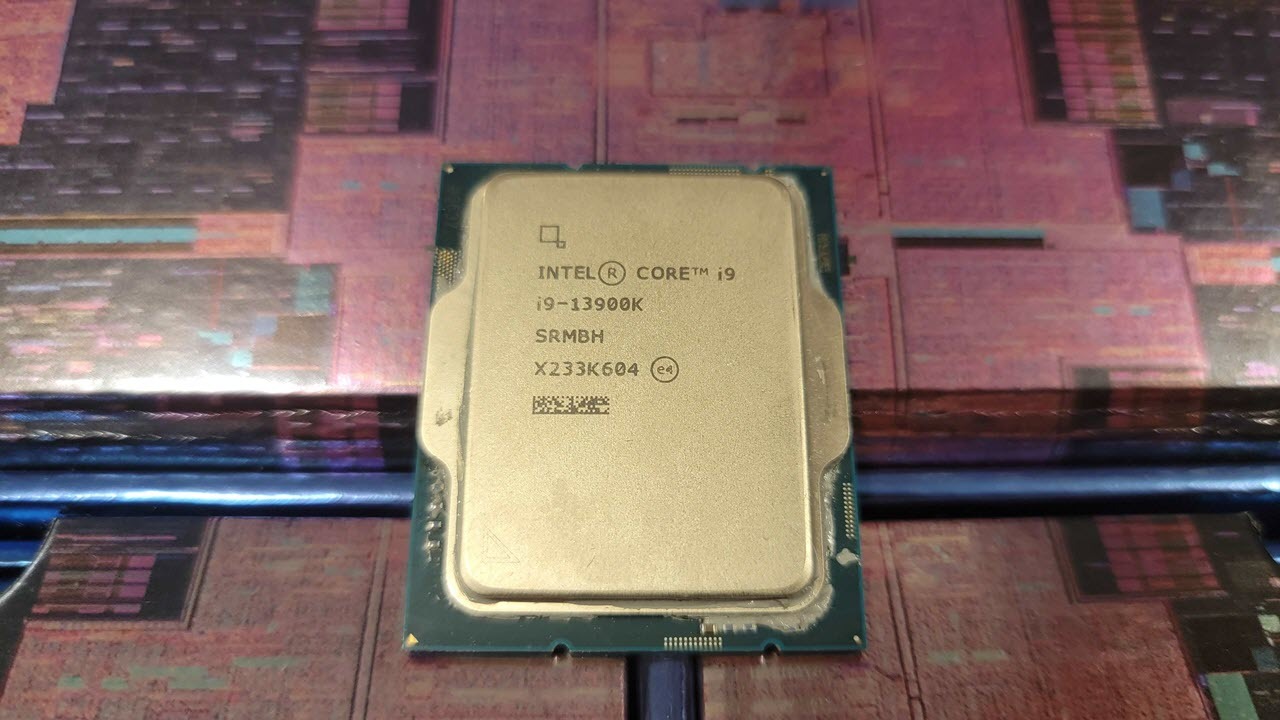Why you can trust Tom's Hardware
Intel's 13th-Gen Raptor Lake processors deliver explosive generational performance increases that beat AMD's similarly-priced Ryzen chips in gaming, single- and multi-threaded work at every price point.
Below, we have the geometric mean of our gaming test suite at 1080p and 1440p and a cumulative measure of performance in single- and multi-threaded applications. We conducted our gaming tests with an Nvidia RTX 4090, so performance deltas will shrink with lesser cards and higher resolution and fidelity settings.
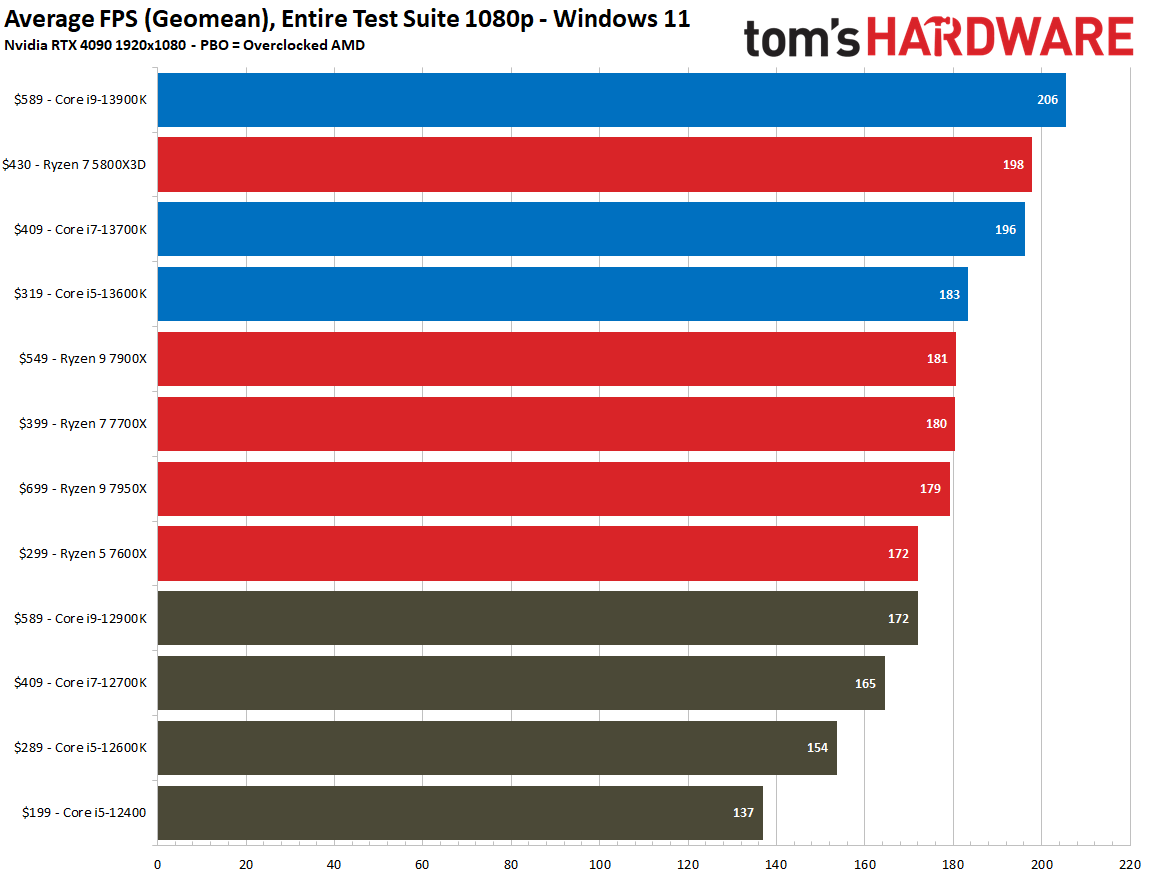
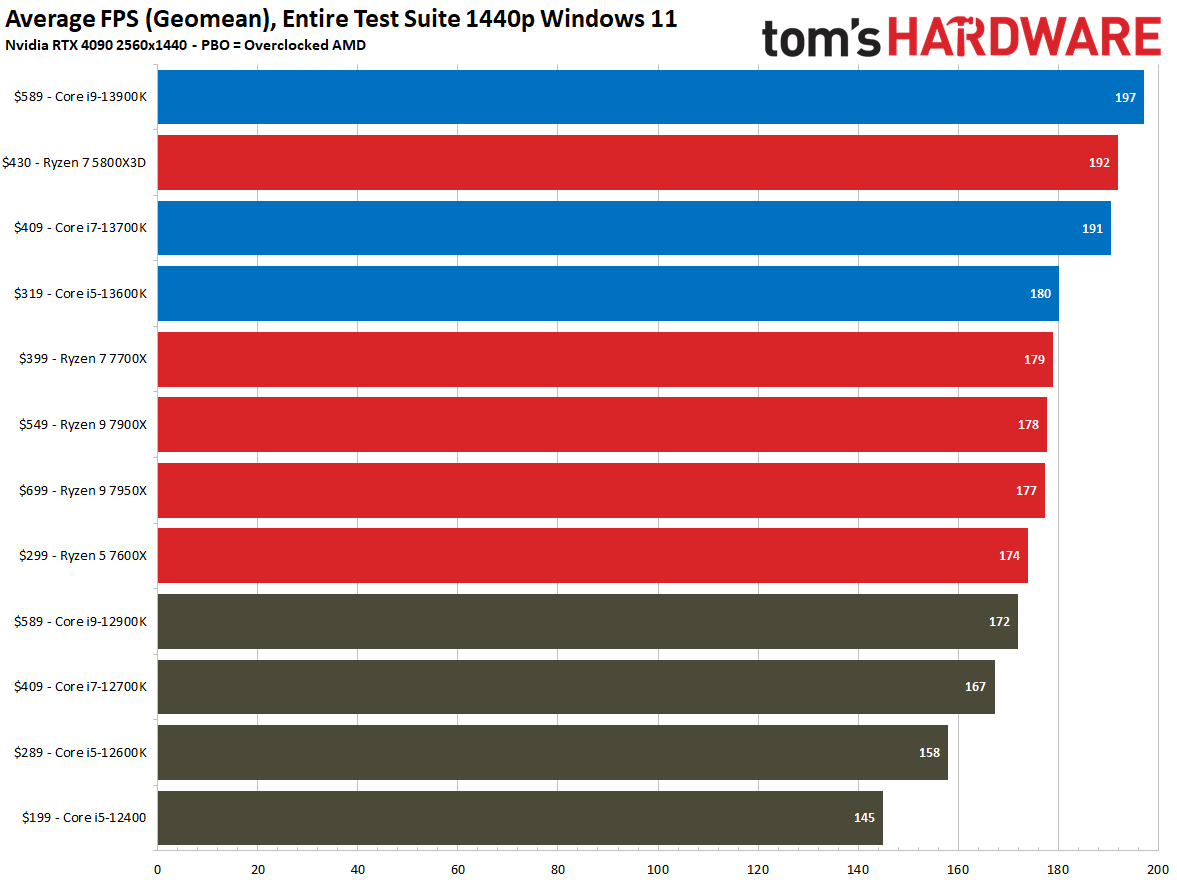
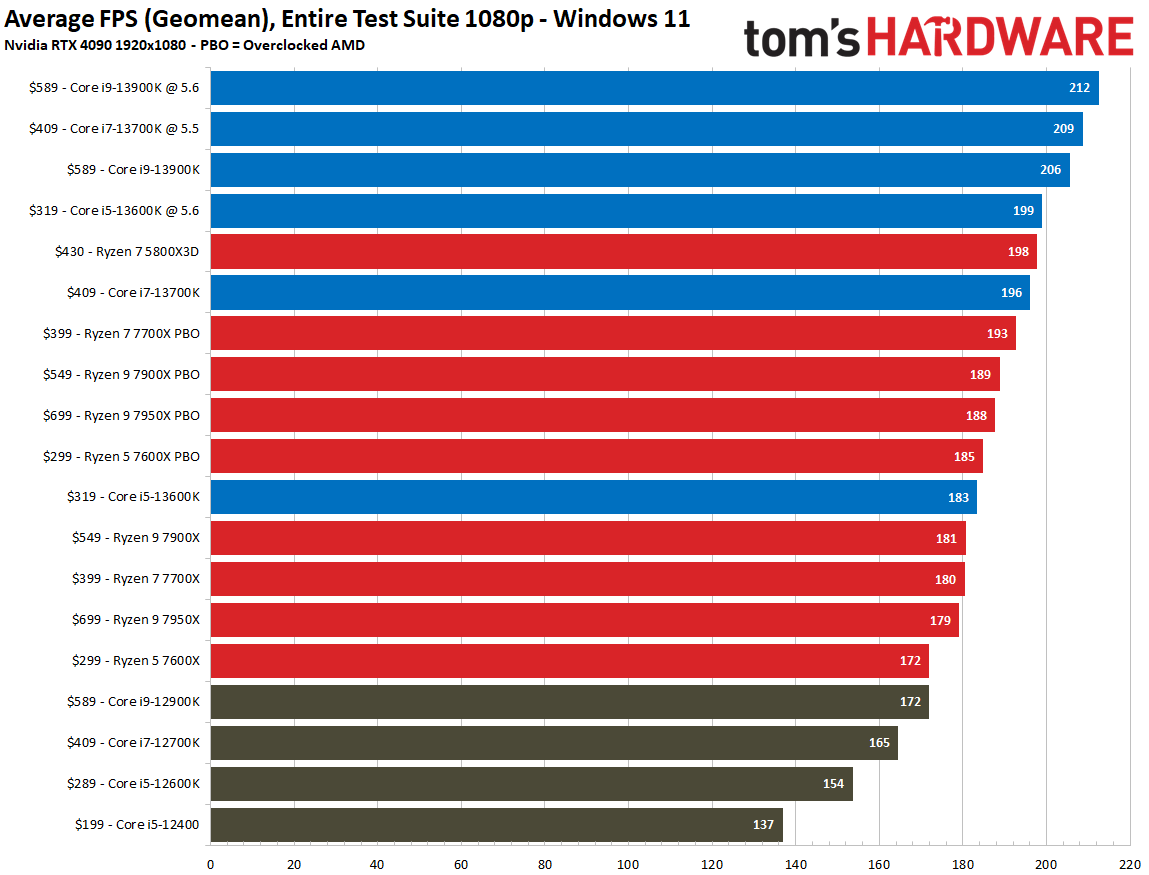
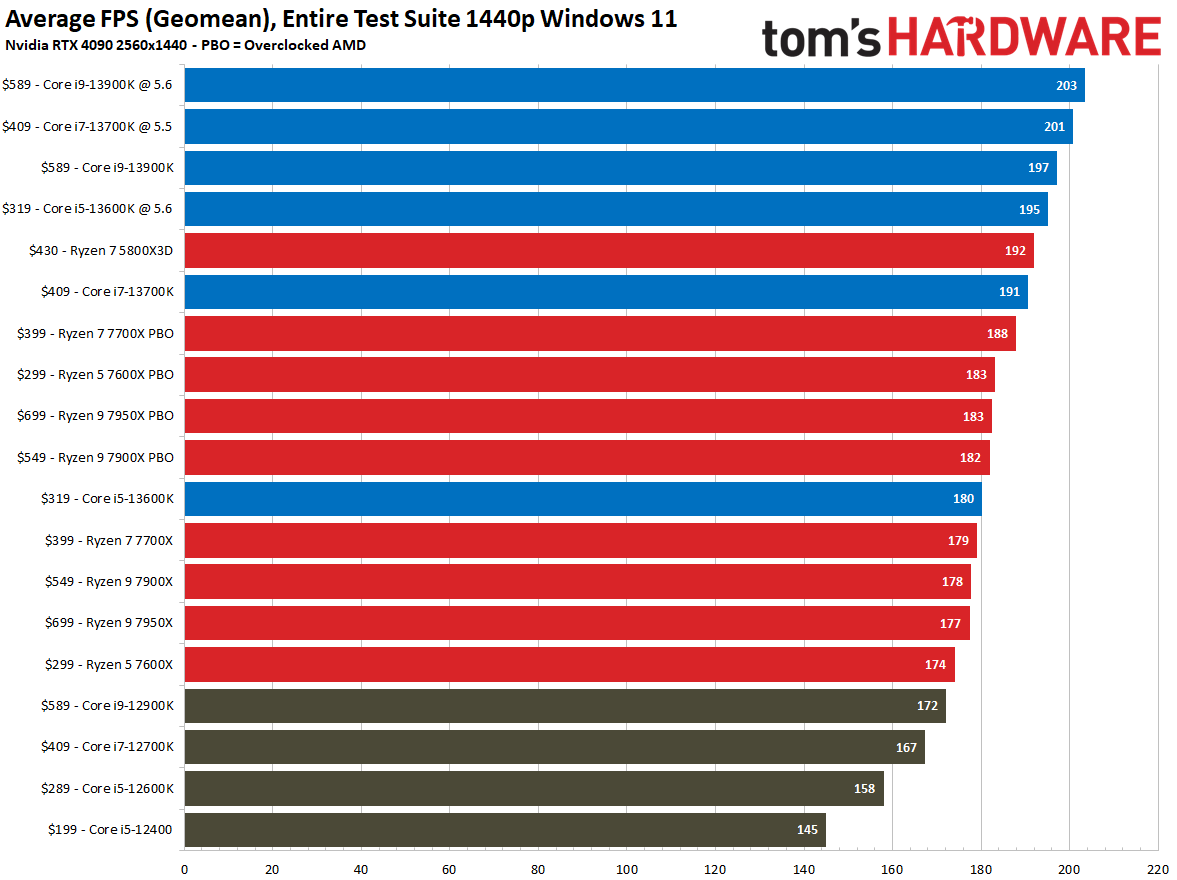
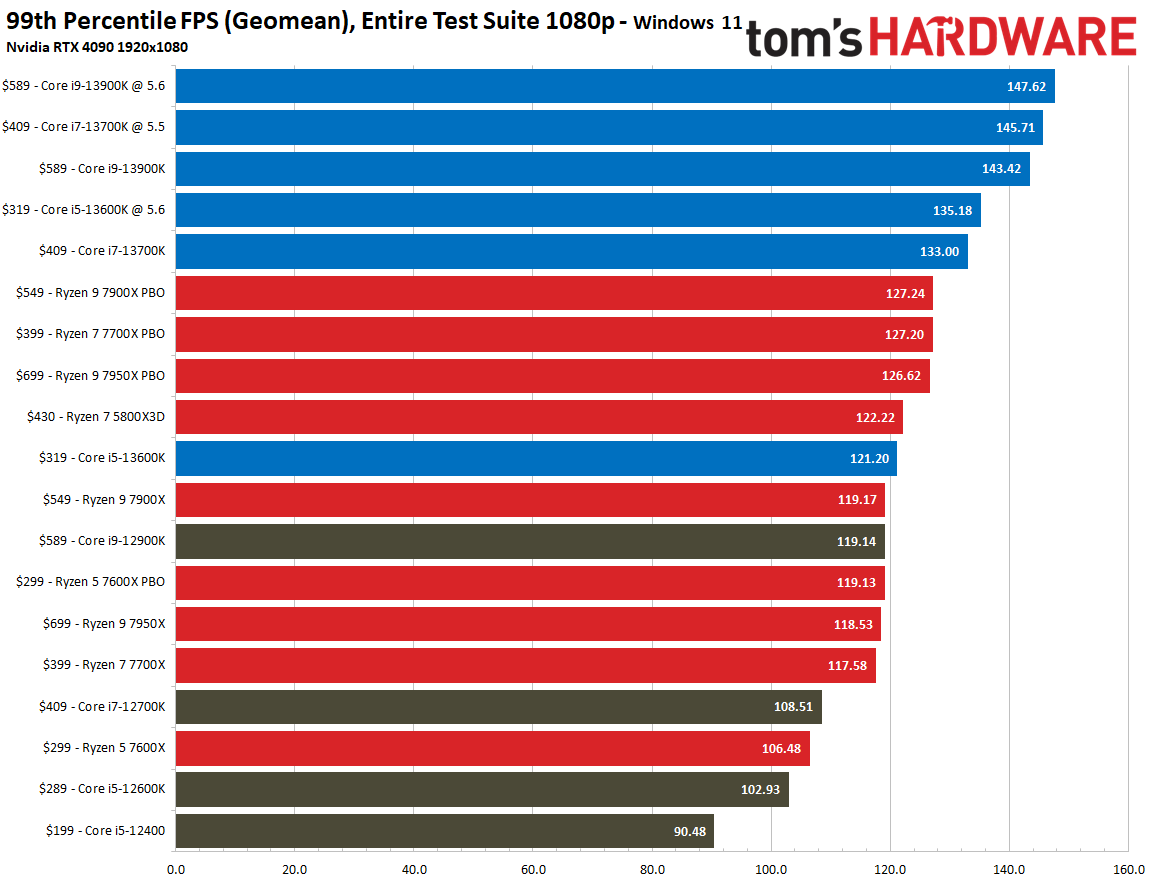
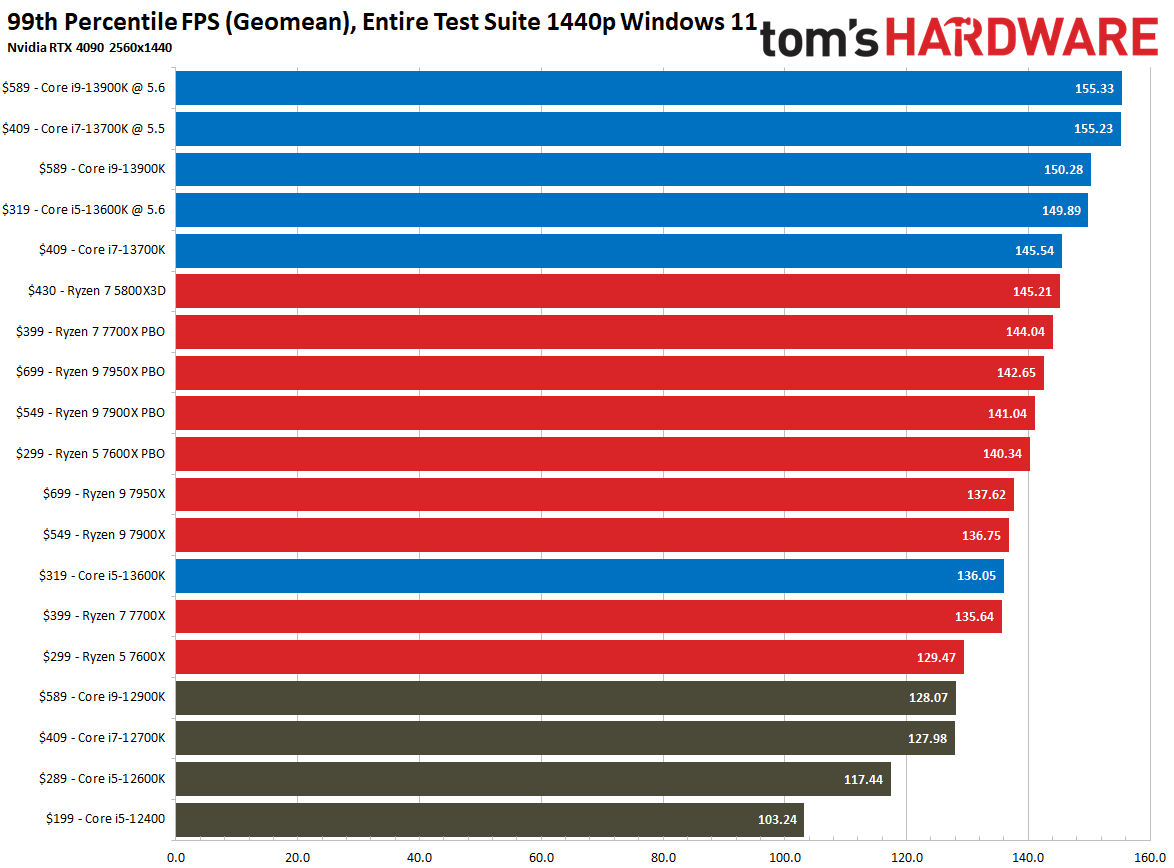
The $589 Core i9-13900K beat the reigning gaming champ, the Ryzen 7 5800X3D, by 4% in our 1080p benchmarks. We have to remember that the 5800X3D's ranking could change based on the games tested, and we used an RTX 4090 for our tests. Most gamers won't have access to such a powerful GPU, so the differences could be slight in the real world. In either case, the 13900K is also 14% faster than AMD's fastest standard chip for gaming, the $549 Ryzen 7 7900X.
However, if you're looking for the best value on a high-performance chip for gaming, the 13900K is overshadowed by its sibling, the $409 Core i7-13700K. This chip delivers 95% of the 13900K's performance in gaming, but for $180 less.
The Core i5-13600K is the best value for most gamers, though, at least until the non-K Core i5s arrive next year. For $319, or $294 for the graphics-less variant, the 13600K is slightly faster than all the Ryzen 7000 chips at gaming, and tapping the incredible overclocking potential propels it into 5800X3D territory.
The Core i9-13900K is best suited for productivity workloads, and here it offers nearly the same threaded horsepower as the Ryzen 9 7950X, but for $100 less. It also beats the 7950X in single-threaded applications. At their respective price points, the Core i7-13700K and Core i5-13600K deliver Ryzen 7000-beating performance in both single- and multi-threaded applications.
Overall, the Raptor Lake lineup offers a balanced performance profile with no clear weaknesses in specific types of workloads, making them agile all-rounder chips for productivity work.
Intel preserved support for DDR4 memory, providing a pathway to significantly lower memory and motherboard costs than you'll currently find with AMD's AM5 ecosystem, which requires DDR5 memory. If you're interested in DDR5, Raptor Lake has incredible overclocking headroom, and pre-certified XMP DDR5-8000 kits are already headed to market. Intel also says you won't lose any performance by going with a previous-gen 600-series motherboard if it has adequate power delivery, opening another pathway for value seekers.
Speaking of power, the 13th-Gen chips are more efficient but are power hungry due to heavy tuning for extreme performance. You'll need to top the Core i9-13900K with a beefy cooler because insufficient cooling will hamstring performance. Cooling requirements for the downstream models aren't quite as stringent, but the Core i5 and i7 models have expanded power budgets that require more capable coolers than we're accustomed to using with lower-end chips.
AMD's chips consume less power and are more efficient, but like the Raptor Lake chips, they also operate at elevated temperatures (95C is expected) and now stretch up to 230W, so the differences aren't quite as pronounced as they used to be. It's important to remember that both Intel and AMD's chips are designed to operate at such temperatures: For instance, Intel's Adaptive Boost Technology is designed to extract the full performance available within the spec'd temperature range, which spans up to 100C. This doesn't harm your chip and it remains fully warrantied, but it means that the quality of your cooler will impact performance.
The Raptor Lake processors provide the highest overclocking ceilings we've ever seen at 5.6 GHz. All three chips we tested reached incredible clock speeds with little effort (ceilings in the 5.5 to 5.7 GHz range with beefy ambient cooling are said to be common). Raptor's overclockability is far more useful in the Core i7 and i5 models, as most of the headroom (and more) is already exposed in the Core i9-13900K right out of the box.
AMD has a Zen 4D chip slated for release later this year, while Intel has a 6 GHz special edition Raptor Lake waiting in the wings. We even recently spotted an unannounced 34-core Raptor Lake at a tradeshow, suggesting that Intel might create a new HEDT platform.
These events will take place as the year progresses, but AMD will need to reduce pricing on its Ryzen 7000 models now to stay competitive with Raptor Lake.
For now, the Core i9-13900K reigns as the fastest gaming chip on the market, albeit by a slim margin, and offers impressive performance in all manner of productivity workloads. Meanwhile, despite a $30 price increase, the Core i5-13600K is equally impressive with class-leading performance at its price point, slotting in as the best value chip for gaming. It also happens to be a great all-rounder and a fun overclocker, too.
- MORE: AMD vs Intel
- MORE: Zen 4 Ryzen 7000 All We Know
- MORE: Raptor Lake All We Know
Get Tom's Hardware's best news and in-depth reviews, straight to your inbox.
Current page: The Raptors Are Out
Prev Page Productivity Benchmarks on Core i9-13900K and Core i5-13600K
Paul Alcorn is the Editor-in-Chief for Tom's Hardware US. He also writes news and reviews on CPUs, storage, and enterprise hardware.
-
Maebius Great review peeps.Reply
Curious, will you test Raptor Lake with DDR4?
Also, aren't new-gen motherboard prices (for both AMD and Intel), kinda uhm, on the expensive side, even for entry level? -
johnnyboy5520 The Raptor Lake 13900K and AMD 7950X are pretty much equivalent. As for gaming, the 7000 X3d chips will bury Raptor Lake. AMDs mistake was keeping the same core count on the lower end SKUs which allowed Intel an easy win in productivity. Gaming is pretty much game dependent. I don't think AMD will make that same mistake going forward. They've got the superior architecture.Reply -
Why_Me Reply
The B760 boards and locked Intel cpu's are due for release this January.Maebius said:Great review peeps.
Curious, will you test Raptor Lake with DDR4?
Also, aren't new-gen motherboard prices (for both AMD and Intel), kinda uhm, on the expensive side, even for entry level? -
TerryLaze Reply
It wasn't a mistake from AMD, it was all they could do.johnnyboy5520 said:The Raptor Lake 13900K and AMD 7950X are pretty much equivalent. As for gaming, the 7000 X3d chips will bury Raptor Lake. AMDs mistake was keeping the same core count on the lower end SKUs which allowed Intel an easy win in productivity. Gaming is pretty much game dependent. I don't think AMD will make that same mistake going forward. They've got the superior architecture.
There are only so many combinations of their CCX they can do.
To increase their core counts on the lower CPUs they would have to add an CCX to them and come up with a way to add a third CCX to their 7950x.
That would mean that they would lose a big chunk of their margins or increase their prices by that amount, both of these options would be very bad for AMD.
If TSMC comes up with a good node shrink then AMD can increase the amount of cores per CCX for the next round, but then again the amount of cores is already ridiculous and only appeals to a very small amount of people. -
PCWarrior Reply
Not sure how you can claim that AMD has the superior architecture. All the IPC tests show that Raptor Cove P-Cores are ahead of Zen 4 in IPC. Also Intel’s hybrid approach is proving highly effective when it comes to heavily multithreaded workloads. The only thing that AMD has an advantage over Intel is in efficiency but that is only thanks to TSMC N5 (which is a full node ahead of Intel 7) and not due to some AMD microarchitectural design advantage. If anything, the very fact that Intel offers the same or superior performance despite being a full node behind is due to having a better architecture. Much like Nvidia’s RTX 3060 (on Samsung 8nm, an equivalent to a TSMC '10nm') versus Intel’s A770 (on TSMC 6nm).johnnyboy5520 said:The Raptor Lake 13900K and AMD 7950X are pretty much equivalent. As for gaming, the 7000 X3d chips will bury Raptor Lake. AMDs mistake was keeping the same core count on the lower end SKUs which allowed Intel an easy win in productivity. Gaming is pretty much game dependent. I don't think AMD will make that same mistake going forward. They've got the superior architecture. -
The Historical Fidelity Intel artificially hiding L2 cache on the alderlake chips is pretty sus to me. Another reason I am done with Intel. Anti-consumer behavior all day.Reply -
The Historical Fidelity Reply
You are absolutely wrong about efficiency, Zen is a much more power and area efficient architecture. Except for when they decide to go for the highest clock speeds possible on the process node they manufacture on. TSMC’s node designs are notoriously voltage hungry on the top of their operating speeds. Bring down the top speed by 2-300 MHz and the zen 4 7950x sips power at a 105 watt TDP (AMD ECO mode) similar to zen 3 power.PCWarrior said:Not sure how you can claim that AMD has the superior architecture. All the IPC tests show that Raptor Cove P-Cores are ahead of Zen 4 in IPC. Also Intel’s hybrid approach is proving highly effective when it comes to heavily multithreaded workloads. The only thing that AMD has an advantage over Intel is in efficiency but that is only thanks to TSMC N5 (which is a full node ahead of Intel 7) and not due to some AMD microarchitectural design advantage. If anything, the very fact that Intel offers the same or superior performance despite being a full node behind is due to having a better architecture. Much like Nvidia’s RTX 3060 (on Samsung 8nm, an equivalent to a TSMC '10nm') versus Intel’s A770 (on TSMC 6nm). -
TerryLaze Reply
On average the 7950x is about 3% faster in multi, (loses hard on single) and uses 20W less power.The Historical Fidelity said:You are absolutely wrong about efficiency, Zen is a much more power and area efficient architecture. Except for when they decide to go for the highest clock speeds possible on the process node they manufacture on. TSMC’s node designs are notoriously voltage hungry on the top of their operating speeds. Bring down the top speed by 2-300 MHz and the zen 4 7950x sips power at a 105 watt TDP (AMD ECO mode) similar to zen 3 power.
It is more efficient, but much more is hugely hyperbolic, it's so little most people won't even bother to call it a difference.
And you can reduce power draw on the 13900k as well and you only lose performance in a very few applications.You know which ones because all the "trusted reviewers" use exclusively those apps and nothing more.
https://www.pcwelt.de/article/1357334/core-i9-13900k-core-i5-13600k-im-test.html -
The Historical Fidelity ReplyTerryLaze said:On average the 7950x is about 3% faster in multi, (loses hard on single) and uses 20W less power.
It is more efficient, but much more is hugely hyperbolic, it's so little most people won't even bother to call it a difference.
And you can reduce power draw on the 13900k as well and you only lose performance in a very few applications.You know which ones because all the "trusted reviewers" use exclusively those apps and nothing more.
https://www.pcwelt.de/article/1357334/core-i9-13900k-core-i5-13600k-im-test.html
That is actually still very high power usage even with MCE off and PL1/2 adherence.
In a thorough review (reference below) of power efficiency we see:
the 7950x at 142 watts beating the 13900k at 142 watts by 13.4% on the combined productivity benching suite graph,
the 7950x at 88 watts beating the 13900k at 88 watts by 14.3% on the combined productivity benching suite graph,
and the 7950x at 65 watts beating the 13900k at 65 watts by 11.7% on the combined productivity benching suite graph.
That’s an average 13.13% better performance efficiency at the same power levels for the 7950x compared to 13900k. That’s a big difference to say the least.
https://tekdeeps.com/energy-efficiency-ryzen-9-7950x-40-over-core-i9-13900k-even-after-tdp-limitation/
